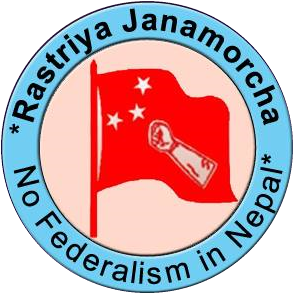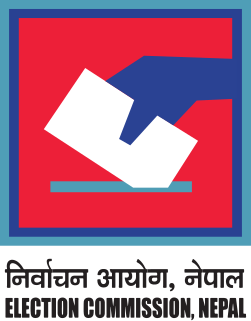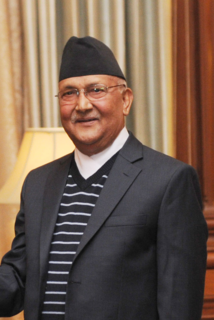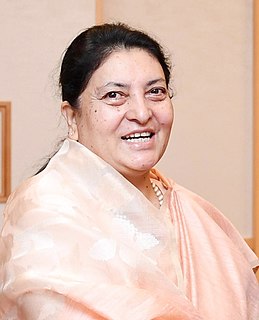Related Research Articles

The politics of Nepal functions within the framework of a parliamentary republic with a multi-party system. Executive power is exercised by the Prime Minister and their cabinet, while legislative power is vested in the Parliament.

The Nepali Congress is the largest social democratic political party in Nepal. It is the current ruling party of Nepal since July 2021.

Pushpa Kamal Dahal, also widely known by his nom de guerre Prachanda, meaning "fierce", is a Nepalese politician who served as Prime Minister of Nepal from 2008 to 2009 and again from 2016 to 2017.

The Communist Party of Nepal , abbreviated CPN (UML), is the largest left-wing party in Nepal since its formation in January 1991, merging the Communist Party of Nepal (Marxist) and the Communist Party of Nepal (Marxist–Leninist). It is the main opposition party in the Federal Parliament of Nepal. It remains one of the two main parties of Nepal including governing Nepali Congress.

Sher Bahadur Deuba is a Nepali politician serving as the Prime Minister of Nepal since 13 July 2021. He has previously served four terms as the prime minister and is the Member of Parliament for the parliamentary constituency of Dadeldhura–1. He has been the president of the Nepali Congress since 2016.

There are three types of elections in Nepal: elections to the Federal Parliament, elections to the state assemblies and elections to the local government. Within each of these categories there may be by-elections as well as general elections. Currently three electoral systems are used: parallel voting for House of Representatives and provincial assemblies, Single transferable vote for National Assembly and first past the post for local elections.

The House of Representatives, or Pratinidhi Sabha is the one of the houses of the Federal Parliament of Nepal, with the other house being the National Assembly. Members of the House of Representatives are elected through a parallel voting system. They hold their seats for five years or until the body is dissolved by the President on the advice of the council of ministers. The house meets in the International Convention Centre in Kathmandu.

The National Assembly or Rastriya Sabha is the one of the houses of the Federal Parliament of Nepal, the other house being the House of Representatives. The composition and powers of the Assembly are established by Part 8 and 9 of the Constitution of Nepal. There are a total of 59 members: 8 members are elected from each of the seven provinces by an electoral college of each province, and three are appointed by the President on recommendation of the government.

The Federal Parliament of Nepal is the bicameral federal and supreme legislature of Nepal established in 2018. It consists of the National Assembly and the House of Representatives as parallel houses.

Rastriya Janamorcha is a political party in Nepal. It was originally founded in 1995 as the legal front of Communist Party of Nepal (Masal). Former Deputy Prime Minister, Chitra Bahdur KC is the chairman of the party.

The president of Nepal is the head of state, head of the executive and supreme leader of Nepal as well as the commander-in-chief of the Nepalese Armed Forces.

The Election Commission is a constitutional body responsible for conducting and monitoring elections, as well as registering parties and candidates and reporting election outcomes, in Nepal. It was born out of the 1950 revolution in Nepal, and was established in law in 1951, although it has been changed somewhat by law over time. It has six members who serve for six-year terms, as established by the Constitution of Nepal. During the Constituent Assembly elections in 2008, it was criticized for not fully upholding its duties, but was acknowledged to have managed the elections well nonetheless.

Khadga Prasad Sharma Oli is a Nepalese politician and former Prime Minister of Nepal. He served three terms as prime minister from 11 October 2015 to 3 August 2016, from 15 February 2018 to 13 May 2021 as the first elected prime minister under the new constitution, and from 13 May 2021 to 13 July 2021.

Constituent Assembly elections were held in Nepal on 19 November 2013. The vote was repeatedly delayed, having previously been planned for 22 November 2012 following the dissolution of the 1st Constituent Assembly on 27 May 2012, but it was put off by the election commission. The Nepali Congress emerged as the largest party in the 2nd Nepalese Constituent Assembly, winning 196 of the 575 elected seats.

The Provinces of Nepal were formed on 20 September 2015 in accordance with Schedule 4 of the Constitution of Nepal. The seven provinces were formed by grouping the existing districts. The current system of seven provinces replaced an earlier system where Nepal was divided into 14 administrative zones which were grouped into five development regions.

Bidya Devi Bhandari is a Nepalese politician who is the second and current president of Nepal.

General elections were held in Nepal in two phases on 26 November and 7 December 2017 to elect the 275 members of the fifth House of Representatives, the lower house of the Federal Parliament of Nepal. The election was held alongside the first provincial elections for the seven provincial assemblies. A political deadlock between the governing Nepali Congress and the winning left-wing coalition over the system used to elect the upper house led to delay in forming the new government. Following the announcement of final result by the Election Commission, K.P. Oli of Communist Party of Nepal was sworn in as Prime Minister on 15 February 2018 by the President according to Article 76 (2) of the constitution. He passed a Motion of Confidence on 11 March 2018 with 208 votes.

Province No. 1 is a province of Nepal. It is located in easternmost part of Nepal. It is surrounded by Tibet of China to the north, the Indian states of Sikkim and West Bengal to the east and Bihar to the south and Bagmati Province and Madhesh Province to the west.

Provincial assembly elections were held in Nepal on 26 November and 7 December 2017 along with the legislative elections. 330 seats in the seven newly created provincial assemblies were elected by first-past-the-post voting and 220 by proportional representation. The election was part of Nepal's transformation to a federal republic. Next Election will be held in 2022 unless dissolved earlier without completing the five years term. 2022 Nepalese provincial election will be the second election for provinces after completion of tenure of five years.
References
- ↑ Election Commission of Nepal Archived 2006-10-12 at the Wayback Machine